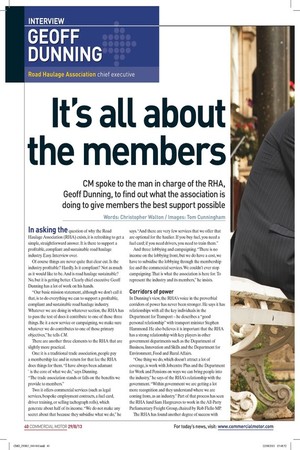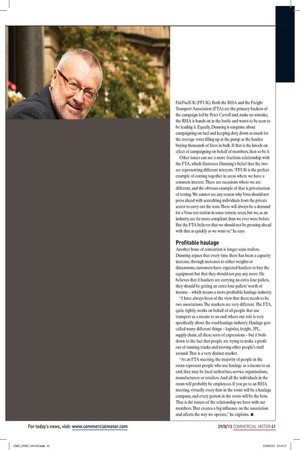INTERVIEW GEOFF DUNNING Road Haulage Association chief executive It's all
Page 33

Page 34

If you've noticed an error in this article please click here to report it so we can fix it.
about the members CM spoke to the man in charge of the RHA, Geoff Dunning, to find out what the association is doing to give members the best support possible Words: Christopher Walton / Images: Tom Cunningham
In asking the question of why the Road Haulage Association (RHA) exists, it is refreshing to get a simple, straightforward answer. It is there to support a profitable, compliant and sustainable road haulage industry. Easy. Interview over.
Of course things are never quite that clear cut. Is the industry profitable? Hardly. Is it compliant? Not as much as it would like to be. And is road haulage sustainable? No, but it is getting better. Clearly chief executive Geoff Dunning has a lot of work on his hands.
"Our basic mission statement, although we don't call it that, is to do everything we can to support a profitable, compliant and sustainable road haulage industry. Whatever we are doing in whatever section, the RHA has to pass the test of does it contribute to one of those three things. Be it a new service or campaigning, we make sure whatever we do contributes to one of those primary objectives," he tells CM.
There are another three elements to the RHA that are slightly more practical.
One: it is a traditional trade association, people pay a membership fee and in return for that fee the RHA does things for them. "I have always been adamant ' is the core of what we do," says Dunning.
"The trade association stands or falls on the benefits we provide to members." Two: it offers commercial services (such as legal services, bespoke employment contracts, a fuel card, driver training, or selling tachograph rolls), which generate about half of its income. "We do not make any secret about that because they subsidise what we do," he
says. "And there are very few services that we offer that are optional for the haulier. If you buy fuel, you need a fuel card; if you need drivers, you need to train them."
And three: lobbying and campaigning. "There is no income on the lobbying front, but we do have a cost, we have to subsidise the lobbying through the membership fee and the commercial services. We couldn't ever stop campaigning. That is what the association is here for. To represent the industry and its members," he insists. Corridors of power
In Dunning's view, the RHA's voice in the proverbial corridors of power has never been stronger. He says it has relationships with all the key individuals in the Department for Transport — he describes a "good personal relationship" with transport minister Stephen Hammond. He also believes it is important that the RHA has a strong relationship with key players in other government departments such as the Department of Business, Innovation and Skills and the Department for Environment, Food and Rural Affairs.
"One thing we do, which doesn't attract a lot of coverage, is work with Jobcentre Plus and the Department for Work and Pensions on ways we can bring people into the industry," he says of the RHA's relationship with the government. "Within government we are getting a lot more recognition and they understand where we are coming from, as an industry." Part of that process has seen the RHA fund Sam Hargreaves to work in the All-Party Parliamentary Freight Group, chaired by Rob Flello 1\TP. The RHA has found another degree of success with
FairFuelUK (I,I,UK). Both the RHA and the Freight Transport Association (FTA) are the primary backers of the campaign led by Peter Carroll and, make no mistake, the RHA is hands on in the battle and wants to be seen to be leading it. Equally, Dunning is sanguine about campaigning on fuel and keeping duty down as much for the average voter filling up at the pump as the haulier buying thousands of litres in bulk. If that is the knock-on effect of campaigning on behalf of members, then so be it.
Other issues can see a more fractious relationship with the FTA, which illustrates Dunning's belief that the two are representing different interests. "I,I,UK is the perfect example of coming together in areas where we have a common interest. There are occasions where we are different, and the obvious example of that is privatisation of testing. We cannot see any reason why Vosa should not press ahead with accrediting individuals from the private sector to carry out the tests. There will always be a demand for a Vosa test station in some remote areas, but we, as an industry, are far more compliant than we ever were before. But the FTA believes that we should not be pressing ahead with that as quickly as we want to," he says. Profitable haulage
Another bone of contention is longer semi-trailers. Dunning argues that every time there has been a capacity increase, through increases to either weights or dimensions, customers have expected hauliers to buy the equipment but that they should not pay any more. He believes that if hauliers are carrying an extra four pallets, they should be getting an extra four pallets' worth of income — which means a more profitable haulage industry.
"I have always been of the view that there needs to be two associations. The markets are very different. The FTA, quite rightly, works on behalf of all people that use transport as a means to an end; where our role is very specifically about the road haulage industry. Haulage gets called many different things — logistics, freight, 3PL, supply chain, all these sorts of expressions — but it boils down to the fact that people are trying to make a profit out of running trucks and moving other people's stuff around. That is a very distinct market. "At an FTA meeting, the majority of people in the room represent people who use haulage as a means to an end, they may be local authorities, service organisations, manufacturers or retailers. And all the individuals in the room will probably be employees. If you go to an RHA meeting, virtually every firm in the room will be a haulage company, and every person in the room will be the boss. That is the nature of the relationship we have with our members. That creates a big influence on the association and affects the way we operate," he explains. •













































